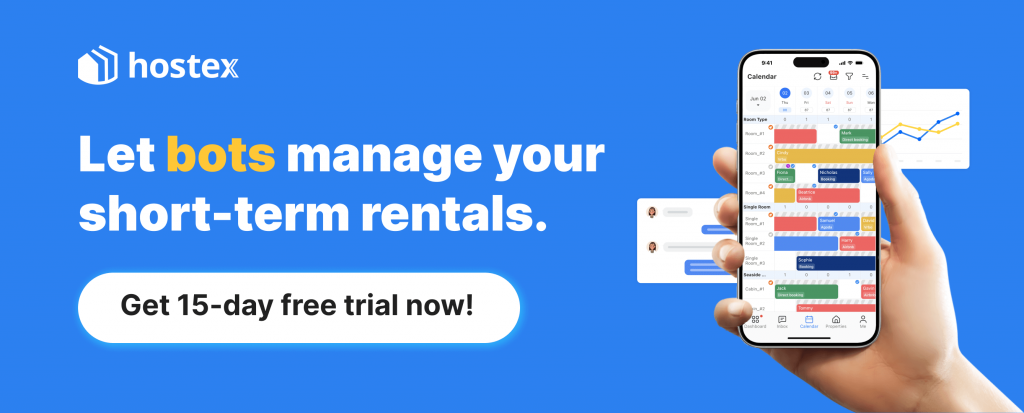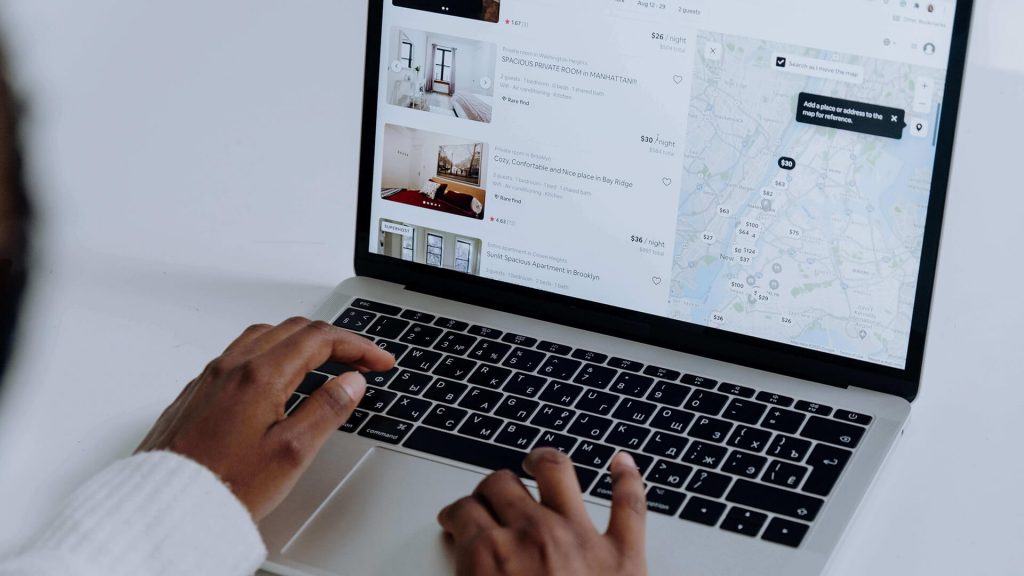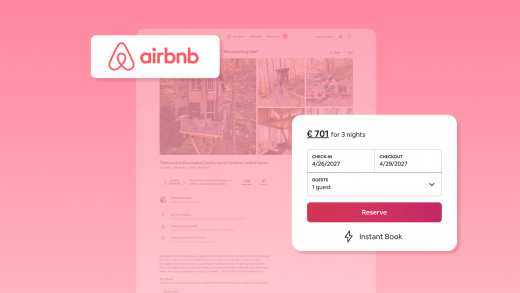Many people are drawn to the idea of starting an Airbnb, imagining passive income and a flexible lifestyle. But in reality, running a successful Airbnb business takes effort, planning, and the right tools. If you’re new to the world of vacation rentals, it’s crucial to understand how to start an Airbnb and learn essential tips to stand out among over 8 million active listings worldwide.
Hostex can help you simplify short-term rental management by automating up to 70% of your daily tasks—from guest messaging to assigning cleaning jobs. All its powerful features start at just $4.9/month.

What to Know Before Starting an Airbnb?
Before diving into the world of Airbnb hosting, it’s important to understand what you’re getting into.
1. Be Mentally Prepared
The short-term rental business is no longer in its rapid growth phase. Today, with over 5 million Airbnb hosts worldwide, competition is intense. If you want to succeed, having the right strategy is more important than ever.
The slice of the market is shrinking, and the return on investment can take time. In low-demand travel destinations, it may take 5 to 8 years just to break even. Ask yourself if you’re truly ready for the commitment—and the risks.
Beyond finances, becoming an Airbnb host also comes with unexpected challenges. You’ll need to navigate local Airbnb regulations, shifting platform policies, and all kinds of guest behaviors.
Only with the right mindset and clear expectations can you push through early setbacks and build a profitable business. If you’re jumping in without doing your homework, you may find yourself learning an expensive lesson.
2. Research the Market
It may sound cliché, but market research is absolutely essential. Like any business, if you rely on guesswork as an Airbnb host, turning a profit will be a challenge.
It would help if you researched the following:
- How many other short-term rentals operate in your area?
- What unique features can set your property apart?
- Which vacation rental platforms are most popular among local guests?
- What types of properties and amenities are in demand?
- Are there professional vacation rental agencies nearby?
- What are the pricing trends for comparable listings in your market?
- What seasonal fluctuations impact demand in your area?
3. Understand Relevant Regulations
Different cities and countries have varying short-term rental regulations, so make sure you comply with all applicable rules to avoid penalties or shutdowns.
As a responsible Airbnb host, ask yourself:
- Which city or state will I operate in?
- What taxes do I need to pay, and how do I file them?
- What are Airbnb’s current policies and terms for my region?
- Should I also consider listing on other OTA platforms?
- What are the local laws governing vacation rentals? Are there specific restrictions or licensing requirements?
4. Create a Budget
Running a business requires practical planning, and launching a short-term rental involves a significant upfront investment. These vacation rental expenses will affect your nightly rates and influence how guests perceive your listing. That’s why estimating and managing Airbnb startup costs is essential.
You don’t need a highly detailed financial breakdown. A realistic estimate based on your current finances will do. Consider the following questions:
- What are the local rental rates for monthly or annual leases?
- Does the property need renovations to be guest-ready?
- What are the renovation costs for different levels of upgrades?
- Do you need to buy new furniture or household appliances?
- What are the essential items, and how much will they cost?
- How many people—and how much time—will daily property management require?
- Will you need to hire a property manager? What are the typical salary ranges in your area?
- Do you need professional cleaning services? What is the average cost per clean?
- What are the expected expenses for routine maintenance and repairs?
- Will you use vacation rental management tools? What are the subscription costs?

How to Start an Airbnb?
If you’ve decided to join the vacation rental industry, it’s time to prepare. Here’s a step-by-step guide on how to start an Airbnb the right way.
1. Choosing the Right Property
Some hosts use their own homes or spare rooms, which simplifies the process. Others rent a space specifically for hosting, requiring more planning.
Consider the following factors that will significantly impact your Airbnb business:
- Location: Properties near popular attractions can bring high returns but face seasonal demand swings. Consider areas within an hour of major tourist hubs.
- Convenience: Guests value convenience. Choose properties near restaurants, shops, entertainment venues, and public transport.
- Management Feasibility: If you live nearby, it’s easier to manage. For remote property management, ensure reliable systems and local support are in place.
- Lease Stability: Urban rentals often have long payback periods. Secure a lease of at least three years to protect your upfront investment. Always disclose your Airbnb hosting plans to your landlord.
- Community Considerations: Residential areas may bring neighbor complaints. Avoid dense neighborhoods when possible. If not, maintain good communication with neighbors.
2. Making Adaptations for Airbnb
Your Airbnb’s design and setup play a major role in attracting bookings. Thoughtful planning ensures your space stands out in a competitive market.
- Style and Target Audience: There are no fixed rules for Airbnb design. Base your setup on your personal style, your target guests, and local trends. For example, business travelers may prefer minimalism, while families value comfort and practicality.
- Professional Design Support: If your budget allows, hire a designer with vacation rental experience. They can optimize layout, lighting, and furniture in ways new hosts may overlook. Airbnb setup differs significantly from decorating a personal home.
- Safety and Easy Maintenance: Designed with long-term use in mind. Choose materials that are easy to clean and durable. Avoid layouts or items that could pose safety risks, such as fire hazards or fragile decor. Good design reduces damage, theft, and maintenance costs.
3. Hiring a Co-Host or Airbnb Property Manager
Managing a vacation rental can quickly become overwhelming. Hiring a cohost or Airbnb property manager can ease your workload.
Here’s how they help with vacation rental management:
- Listing your property to improve visibility on multiple platforms.
- Adjusting pricing dynamically to maximize revenue.
- Syncing calendars to avoid double bookings.
- Handling guest communication and resolving issues promptly.
- Managing smooth check-in and check-out processes.
- Monitoring and responding to guest reviews.
- Running marketing campaigns to increase bookings.
- Coordinating cleaning and maintenance services.
- Setting clear check-in policies for guest convenience.
- Ensuring your property complies with local laws and regulations.
You can also use Hostex to automate up to 70% of daily rental tasks — from guest messaging to cleaning assignments. This short-term rental automation tool starts at just $4.9/month, making management easier and more efficient.

4. Hiring Professional Cleaners
Cleaning is one of the most fundamental and crucial tasks in managing a vacation rental. Excellent vacation rental cleaning not only keeps your property in top condition but also boosts guest satisfaction and positive reviews.
To keep your space consistently guest-ready:
- Find Reliable Services: Use local platforms like Properly or Turno, or seek trusted personal recommendations.
- Create a Checklist: A detailed cleaning checklist ensures cleaners follow consistent standards every time.
- Automate Tasks Management: PMS such as Hostex can schedule and automate cleaning tasks based on check-in and check-out times, saving you time and reducing errors.
5. Developing a Marketing Plan
A strong Airbnb marketing strategy is vital for attracting guests in today’s competitive vacation rental market.
Here are key marketing tips:
- Craft an Engaging Listing: Highlight your property’s unique features and amenities clearly.
- List on Multiple Platforms: Use various vacation rental websites to maximize your listing’s exposure.
- Design Promotional Campaigns: Offer limited-time discounts or special deals to encourage bookings.
- Leverage Social Media: Promote your rental through local tourism sites and social channels to attract a broader audience.
6. Listing on Airbnb
Listing your property on Airbnb is straightforward — just follow Airbnb’s official guidelines.
Here, we focus on extra Airbnb listing tips to help your vacation rental stand out and attract bookings.
- Create a Catchy Title: Keep it short and highlight key advantages, like “Luxury Apartment in City Center” or “Cozy Cottage Near the Beach.”
- Incorporate SEO Keywords: Use appealing keywords in your description, such as “close to attractions,” “unique,” “comfortable,” and “family-friendly” to improve search visibility.
- Showcase Unique Features: Emphasize your property’s special amenities and the overall guest experience.
- Avoid Jargon: Use clear, simple language in the title and description to appeal to a wider audience.
- Professional Photography: Invest in high-quality photos if possible. Great vacation rental photos significantly boost bookings.
- Include Detail Shots: Capture important details like linens, decor, and amenities to create a trustworthy listing.
- Offer Discounts: Consider introductory discounts to attract your first guests quickly and gather positive reviews.
- Set Clear House Rules: Clearly state your expectations regarding noise, pets, and smoking to prevent misunderstandings.
- Get Feedback: Before publishing, ask friends or family to review your listing and suggest improvements.
- Add a Personal Touch: Upload a friendly profile photo, write a brief introduction about yourself, and share your interests to build trust with guests.

Effective Airbnb Host Tips for Beginners
Congratulations! By reading this guide, you’re well on your way to becoming a successful Airbnb host.
To truly excel, it’s important to master effective Airbnb host tips and operational strategies. These not only boost your occupancy rates but also improve guest satisfaction and encourage repeat bookings.
Here are practical tips for beginners to quickly stand out:
1. List Your Property on Multiple OTA Platforms
While Airbnb remains popular, many travelers also search on other sites. Relying solely on Airbnb may cause you to miss valuable booking opportunities.
By using multi-channel distribution, you reach a broader audience and increase your booking potential.
- Booking.com attracts many business and leisure travelers worldwide. Its multi-language, multi-currency interface suits international guests perfectly.
- Vrbo focuses on families and groups seeking entire homes or villas. It’s ideal for longer stays and group vacations.
- Expedia combines flights, hotels, and car rentals, targeting travelers needing full-service trip planning. Listing here helps capture diverse travel needs.
- Google Vacation Rentals connects travelers through Google Search and Maps, driving traffic to your direct booking website.
Listing on these platforms strategically will help you maximize exposure and increase Airbnb bookings.
2. Keep Your Calendar Updated
For hosts managing listings across multiple OTAs, keeping your vacation rental calendar updated is crucial. Overbooking or double bookings can frustrate guests, hurt your reputation, and lead to penalties from platforms.
To prevent these issues, consider using a Property Management System. Tools like Hostex allow you to manage all listings in one unified calendar effortlessly. Plus, with over 70% of daily tasks automated, you’ll have more time to focus on growing your business.
Key Features:
- Real-time Sync: Sync calendars, prices, and availability between OTAs and your website. This eliminates double bookings and manual errors.
- Automated Messaging: Auto-respond to guest inquiries, send trigger-based messages, and automate review requests to simplify guest communication.
- Powerful Automation: Automate check-in instructions, pricing updates, reviews, and cleaning tasks—all without lifting a finger.
- Third-Party Integrations: Seamlessly connect with tools like PriceLabs, Rategenie, Turno, smart locks, and other STR essentials.
- Team Collaboration: Assign roles to team members—owners, cleaners, accountants, and more—with customizable access permissions.
- Performance Analytics: Generate detailed reports segmented by platform, so you can optimize underperforming channels.
- Mobile Control: Manage your business anytime, anywhere with the Hostex mobile app.
- Clear Pricing: Hostex offers transparent, all-inclusive pricing with no hidden fees. Starting from 4.9 USD per month.
3. Develop a Reasonable Pricing Strategy
Your Airbnb pricing strategy plays a crucial role in both your occupancy rate and overall revenue. To stay competitive and profitable, consider factors like location, seasonality, and local events.
Here’s how to create a pricing plan that supports vacation rental revenue optimization:
- Understand Your Costs: Factor in all expenses, including cleaning services, property maintenance, utilities, and OTA commissions. Your pricing should leave room for a healthy profit.
- Set a Base Price: Use market research to establish a competitive base price. Analyze similar listings in your area to understand what guests are willing to pay.
- Use Dynamic Pricing: Adjust your rates based on demand. For example, raise prices during holidays or local events, and offer promotions during slower seasons. You can automate this using dynamic pricing tools for short-term rentals, like PriceLabs or Rategenie.
- Apply Psychological Pricing: Set prices like $199 instead of $200—it’s a small change that can make your listing more appealing.
- Continuously Optimize: Regularly review your booking performance and guest feedback. Tweak your pricing strategy to stay aligned with market trends and guest expectations.
Want a deeper dive? Check out our full guide: The Ultimate Guide to Smart Pricing for Short-Term Rentals. Mastering your pricing is one of the best Airbnb hosting tips for maximizing income while staying competitive.
4. Timely Guest Communication
Smooth and timely guest communication is essential for building trust and delivering a memorable guest experience. Whether before, during, or after the stay, proactive messaging shows professionalism and care.
Here are some strategies to improve your Airbnb guest communication:
- Respond to Inquiries Quickly: Fast replies to pre-booking questions help guests feel valued and increase your chances of securing the booking.
- Confirm the Booking Professionally: Once a booking is confirmed, send a thank-you message that includes reservation details, check-in instructions, and contact info. This sets a positive tone from the start.
- Send Pre-Arrival Reminders: A few days before arrival, message guests with practical info, such as check-in time, parking tips, Wi-Fi passwords, and nearby attractions. This helps guests feel prepared and welcomed.
- Check In After Arrival: On the day of arrival, follow up with a warm welcome message. Ask if everything is in order and let them know you’re available for any assistance.
To make all this easier, use automated messaging for vacation rentals. With AI-powered tools like Hostex, you can respond to inquiries 24/7, ensuring a consistent and professional guest experience without constant manual effort.
5. Encouraging Positive Reviews
Positive Airbnb reviews are essential for improving your listing’s visibility, building trust, and attracting future bookings. Great reviews can boost your chances of becoming a Superhost and improve your vacation rental reputation management.
Here are a few proven ways to encourage 5-star reviews on Airbnb:
- Offer a Small Departure Gift: Leave a thoughtful touch at checkout, such as a thank-you note or a small local treat. This simple gesture can leave a lasting impression and make guests feel truly appreciated.
- Provide Exclusive Discounts for Return Guests: A discount code for a future stay encourages repeat bookings and shows guests you value their loyalty. Satisfied returning guests are also more likely to share positive experiences publicly.
- Ask Sincerely for a Review: After check-out, send a kind thank-you message and gently remind guests to leave a review. Let them know their guest feedback matters—for example: “Thank you for staying with us! Your review helps us grow and helps future guests make informed choices.”
For more in-depth strategies, don’t miss our full article on how to get more 5-star reviews and boost your Airbnb ranking.
6. Timely Cleaning and Maintenance
A clean and well-maintained property is one of the most basic—and most important—expectations for guests. Poor cleanliness or delayed repairs can quickly lead to negative Airbnb reviews and lower guest satisfaction.
Here’s how to maintain high Airbnb cleaning standards and keep your property in top condition:
- Set Clear Cleaning Protocols: Create a detailed short-term rental cleaning checklist to ensure consistency. This helps maintain quality and improves efficiency for your cleaning team.
- Automate Real-Time Notifications: Use property management software to automatically notify cleaners right after check-out. This reduces the risk of missed cleanings and keeps turnovers on schedule.
- Perform Regular Maintenance Checks: Schedule routine inspections of essential systems like HVAC, water heaters, and kitchen appliances. Preventive maintenance helps reduce emergency repairs and ensures everything runs smoothly.
- Resolve Issues Promptly: Make it easy for guests to report problems and respond quickly. Fast vacation rental maintenance boosts guest confidence and minimizes disruption.
- Track Maintenance History: Keep detailed records of all repairs and service checks. Over time, this helps identify recurring issues and improve your maintenance strategy.

Common Questions for New Airbnb Hosts
By this point, you have mastered most of the tips for starting an Airbnb. Here are some additional common questions and their answers to help you better understand the key elements of operating successfully on Airbnb.
1. How does Airbnb work?
Airbnb is a global short-term rental platform that allows property owners and individuals to rent out spare rooms, apartments, or vacation homes to travelers. As a host, you create a listing, set prices and availability, and manage guest interactions. Airbnb handles payments, provides customer service, and helps maintain a safe and trusted environment for both hosts and guests.
2. How to become an Airbnb host?
Becoming an Airbnb host is straightforward. Just follow these steps:
- Go to the Airbnb website and click “Airbnb your home.”
- Register and complete the host verification process. You’ll typically need to upload a government-issued ID and basic personal information.
- Airbnb may conduct additional checks, including credit history, in certain countries.
Once verified, you can start building your listing and welcoming your first guests.
3. What is the minimum age to host an Airbnb?
According to Airbnb’s official policy, you must be at least 18 years old to create a host account. If you’re under 18, you can consider partnering with a parent, guardian, or adult friend to co-host the listing.
4. How much can you earn with Airbnb?
Airbnb income depends on various factors—location, property size, seasonality, guest reviews, and pricing strategy all play a role. According to Airbnb data, the average host earns around $9,600 annually.
However, in popular tourist cities or during peak seasons, some hosts achieve occupancy rates of 70% to 90%, resulting in significantly higher short-term rental earnings. You can use tools like AirDNA or Mashvisor to estimate your potential income based on your location and property type.
5. How can you make money on Airbnb without owning property?
You don’t need to own property to earn money on Airbnb. Here are some practical alternatives:
- Subletting: Rent a property from a landlord and then sublet it on Airbnb. Make sure to get written permission to avoid legal issues.
- Property Management: Offer Airbnb property management services to existing hosts. Handle bookings, guest communication, and cleaning in exchange for a commission.
- Airbnb Experiences: If you have a skill—like photography, cooking, or guiding city tours—you can host Airbnb Experiences and get paid for your time.
For a more detailed breakdown, check out our article: How to Earn Money on Airbnb Without Owning Property.
6. What support does Airbnb offer for new listings?
Airbnb provides various forms of support for new listings, including:
- New Host Guide: Resources and training to help new hosts effectively manage their listings.
- Promotional Opportunities: After launching a new listing, Airbnb may offer additional exposure to help you attract your first guests.
- Customer Support: 24/7 customer service to assist you with any operational issues.
7. How to quickly improve your Airbnb ranking?
Improving your Airbnb search ranking helps attract more bookings. Try these proven strategies:
- Optimize Your Listing: Use strong titles and relevant Airbnb keywords in your description to boost visibility in search results.
- Use High-Quality Photos: Invest in professional photography. Highlight unique amenities and ensure the space looks clean, bright, and welcoming.
- Deliver Great Guest Experiences: Aim for consistent 5-star reviews. Excellent communication, cleanliness, and attention to detail all matter.
- Update Regularly: Refresh your listing often. Adjust prices, update the calendar, and respond quickly to booking inquiries.
8. How to get the Superhost title?
Becoming a Superhost on Airbnb boosts your credibility and increases booking rates. To earn the badge, you must meet the following criteria:
- Maintain Excellent Ratings: Keep an average rating of 4.8 stars or higher across all reviews.
- Respond Promptly: Maintain a response rate of 90% or above by replying to inquiries within 24 hours.
- Provide Outstanding Service: Ensure your vacation rental is clean, well-stocked, and accurately represented in the listing. Communicate clearly with guests before, during, and after their stay.
- Consistency Matters: Airbnb reviews your performance every quarter. So, consistency is key to becoming and remaining a Superhost.
For a full breakdown, check out our detailed article: How to Become a Superhost on Airbnb
9. How to Get the Guest Favorite Badge on Airbnb?
The Airbnb Guest Favorite Badge highlights listings that consistently deliver outstanding guest experiences. Unlike the Superhost badge, this badge is updated daily based on recent performance, making it a strong indicator of current quality.
Airbnb evaluates millions of stays using guest feedback on experience, service, and reliability. Only listings that truly delight guests are awarded this badge.
Here’s what you need to qualify:
- At least 5 completed guest reviews
- An average rating of 4.9 stars or higher
- A cancellation rate below 1%
- No recent guest complaints related to quality or service
In addition, your listing should consistently meet guest expectations in the following areas:
- Smooth and easy check-in
- Impeccable cleanliness
- Accurate listing description
- Responsive communication
- Great location
- Good value for money
Airbnb’s system continuously monitors performance, so maintaining quality is key to keeping the badge.
For a detailed breakdown, check out our article: How to Get the Airbnb Guest Favorite Badge

Final Thoughts
Starting and managing a successful Airbnb rental requires careful planning, ongoing effort, and a commitment to guest satisfaction. By understanding the market, setting the right price, maintaining high standards, and leveraging smart tools, you can stand out in this competitive industry.
To simplify your hosting journey, consider using Hostex. It automates up to 70% of your daily tasks—from guest communication to cleaning coordination—so you can focus more on growing your business and providing exceptional experiences.
With the right mindset and tools, your Airbnb venture can become both rewarding and profitable.





🆙
Thank you for sharing
شكرا لكم على المعلومات القيمة والنصائح الجيدة اتمنى ان يوما ان اعمل مع شركتكم Airbnb